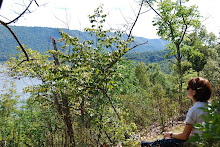 Here's a link to the follow-up NYT column about Yachana (see below post).
Here's a link to the follow-up NYT column about Yachana (see below post). Columnist Nicholas Kristoff tells us why the work of Yachana -- specifically community empowerment within the Amazon, which provides locals with economic incentives to not cut down Amazonian trees -- is so important.
"Somewhere in the world, we humans cut down an area of jungle the size of a football field every second of every day, and deforestation now contributes as much to global warming as all the carbon emitted by the United States. By one calculation, four years of deforestation have the same carbon footprint as all flights in the history of aviation up until the year 2025."
We don't hear as much about deforestation contributing to climate change as CO2 emissions. Perhaps this is because on a personal level, resolving the tree-cutting problem feels more out of reach than cutting our personal greenhouse gas emissions.
We know we can and should: purchase electricity from a company offering a large share of renewable energy; walk or ride a bike instead of driving; purchase a car with high gas mileage; turn down/up our thermostats in the winter/summer; replace incandescent light bulbs with compact fluorescents; be smart shoppers when buying energy-gulping appliances like fridges and furnaces.
But we aren't told very often what we can do to prevent further global deforestation, which is an equally substantial contributor to the climate crisis.
Well, here are just three ideas of the type from the Union of Concerned Scientists' "Ten Personal Solutions" to global warming:
1.Buy good wood.
When buying wood products, check for labels that indicate the source of the timber. Supporting forests that are managed in a sustainable fashion makes sense for biodiversity, and it may make sense for the climate too. Forests that are well managed are more likely to store carbon effectively because more trees are left standing and carbon-storing soils are less disturbed."
2. Plant a tree.
You can also make a difference in your own backyard. Get a group in your neighborhood together and contact your local arborist or urban forester about planting trees on private property and public land. In addition to storing carbon, trees planted in and around urban areas and residences can provide much-needed shade in the summer, reducing energy bills and fossil fuel use.
3. Let policymakers know you are concerned about global warming. (and specifically deforestation)
Our elected officials and business leaders need to hear from concerned citizens. Sign up for the Union of Concerned Scientists Action Network to ensure that policymakers get the timely, accurate information they need to make informed decisions about global warming solutions.
Also, an organization called Rainforest Action Network is also
 currently campaigning against current practices in palm oil production, the majority of which takes place in rainforest regions, where "pristine rainforests are being clear-cut and burned to make way for palm oil plantations." This contributes to global warming ("Deforestation is the primary reason that Indonesia and Brazil are now the world’s third and fourth largest greenhouse gas polluters," according to RAN), and it also contributes to the destruction of vital ecosystems and displacement of indigenous people/small farmers. There is an increasing demand for palm oil, which is used in foods, soaps and cosmetics AND as an industrial-scale biofuel.
currently campaigning against current practices in palm oil production, the majority of which takes place in rainforest regions, where "pristine rainforests are being clear-cut and burned to make way for palm oil plantations." This contributes to global warming ("Deforestation is the primary reason that Indonesia and Brazil are now the world’s third and fourth largest greenhouse gas polluters," according to RAN), and it also contributes to the destruction of vital ecosystems and displacement of indigenous people/small farmers. There is an increasing demand for palm oil, which is used in foods, soaps and cosmetics AND as an industrial-scale biofuel. So. The bottom line is, let's not forget about the disastrous impacts of deforestation that we all contribute to every day. Be a responsible shopper question where your wood and ingredients are coming from.



No comments:
Post a Comment